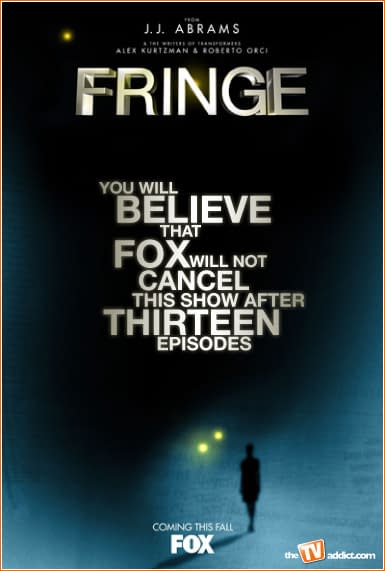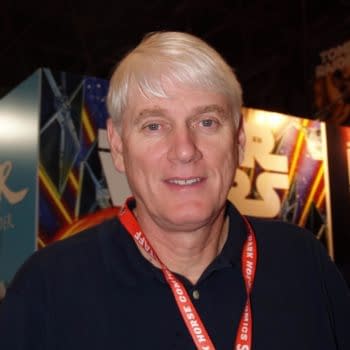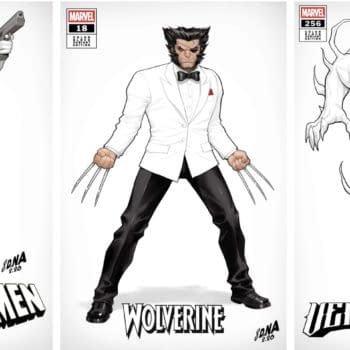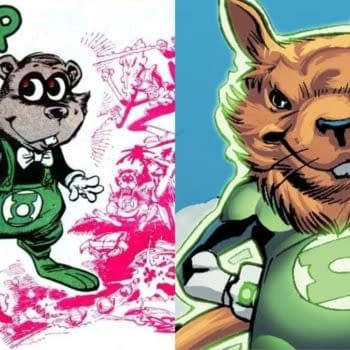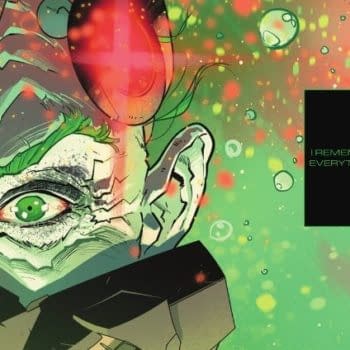Posted in: Recent Updates | Tagged: doctor who
Five Act Autopsy by Alasdair Stuart #1: Fringe Politics
Hi, I'm Alasdair and I wear lots of hats. I'm a freelance journalist with work appearing in everything from The Guardian to Sci Fi Now, a parsec-award winning podcaster as the host of Pseudopod, the editor of Hub and a roleplaying game writer. That last one is especially fun, as I'm currently writing the 9th Doctor boxed set for the upcoming Doctor Who RPG.
The thing about having lots of hats is deciding which one to wear and Rich has very kindly given me the opportunity to wear more than one here. In coming weeks you'll be getting production notes for one of the Doctor Who roleplaying game scenarios I'm working on, a look at some of the fascinating work being done in tabletop roleplaying at the moment and a look at why no one ends the world quite like the English. However, this week we've got the first Five Act Autopsy, where I pull apart one of my favourite TV shows and see what makes it tick. So stick around, just stand back a little. Spoilers will abound and our first subject gets a little messy…
Inciting incidents don't get much better than the opening five minutes of Fringe. A virus is released on a 747 in mid flight, killing everyone aboard and leading to the plane landing on auto pilot on US soil. It's a horrible sequence, and neatly hooks both the characters and the audience.
However, the plane is actually carrying something far more virulent, far more deadly, than the virus ; the future. As every primary intelligence agency in the US is called to the scene, FBI Agent Olivia Dunham is drawn into a world where 'Do what thou wilt shall be the whole of the law' is as close to scientific method as anyone gets. To survive long enough to understand, Olivia finds herself allied with Peter Bishop, a brilliant con man and his father, Walter, a genius who has spent seventeen years in an asylum.
If this was all Fringe was, I'd still be going home happy. The X-Files template of serious men and women in good suits doing bad things for morally ambiguous reasons was over due a return to the screen and superficially, that's what we have here; The X-Files with the gender roles reversed, a case of post-millennial tension where science is evil and progress is nothing more than a lower body count. .
A season and a bit in though, it's become clear Fringe is something much, much more than that. The central concept of The Pattern, a series of scientific experiments memorably described by Olivia's boss Phillip Broyles as using the world as their petri dish is a wonderful, nightmarish idea that not only slots into the endemic cynicism of the times but also infects the structure of the show. The three main characters aren't just investigating the Pattern, they're part of it, three standard character types broken down into their constituent elements and built back up as something far odder.
The process is clearest with Olivia, and, like all good magic tricks, is shown to the audience even though they don't realise it at the time. The very first episode sees John Scott make a reference to how she's faster and stronger than any other agent, a comment that, at the time, plays like nothing more than a compliment from a lover. As the series progresses though, that comment becomes the first in a trail of breadcrumbs that leads to the truth about Olivia; that she was part of an experimental drug trial that caused superhuman abilities to manifest in those it didn't kill, that she was the strongest candidate and crucially that she has met both Walter and William Bell, the series' second DaVinci, before.
In one of the best scenes so far, Olivia confronts her test partner and both she and the viewer see how similar they are; both are reticent, both only wear black and grey, both have kept themselves in shape, as they were instructed. Both are weapons but Olivia is the only one that's survived the forging process intact. Recent episodes have even hinted that Olivia is Bell and Walter's masterpiece, a woman with the ability to move between the universes and defend her own from attack. Whether or not she wants this is, of course, irrelevant. Olivia is a weapon in someone else's war and weapons don't get a vote.
Peter if anything is even stranger, a man who is handsome, charming, witty, clearly very intelligent and not even a little safe, someone who manages to seem restless and ill at ease even when he's not moving. Joshua Jackson plays him as someone who's charming only as long as he needs to be, a physical threat with none of the discipline that Olivia has who is prepared to do whatever he feels is necessary to protect the innocent. This leads to him taking a direct leadership role in season two, turning Fringe Division into a pro active instead of reactive organisation.
That change, in turn, throws the real tragedy of Peter, that he was snatched from the second universe when this universe's Walter lost his son, into stark relief. This act of total love and total selfishness is why Peter can[t settle, why Walter is insane and may be the reason the war between the universes began. It's also the key to the changes the characters undergo and, just as Olivia is turned into a weapon by her experiences, Peter becomes a soldier. What side he'll ultimately fight on remains to be seen.
Finally, Walter Bishop is more Prospero than Einstein, a man for whom science and art are as indivisible as life and death or fantasy and reality. John Noble has the toughest job of all and it would be all too easy for him to use Walter's inability to function in the real world as an excuse to chew scenery or allow the character to become little more than Of Mice and Men's Lenny with a couple of doctorates.
Instead, he plays Walter as a man who is broken enough to need help but intelligent enough to realise how much he's broken. Noble gives Walter flashes of absolute brilliance, moments where we see the man he was before the asylum that not only show how much has been taken from him but suggest he uses how others perceive him to his own ends. After all, under the fascination with modern culture and junk food, this is still the man who set out to build a time machine in order to save his son's life and ended up doing something much, much worse. He's Bell's shadow, a genius who has done most of the work and taken most of the damage and he knows much more than he's allowing himself to remember. That last point is key as it's becoming clear that whilst Olivia is a weapon and Peter a soldier in the coming war, Walter is something infinitely more dangerous; a modern day Oppenheimer limited only by the damage he's done to himself.
These three characters are set in a world which is an odd combination of mundane and bizarre, as the war between universes begins to build and every investigation appears to lead back to Massive Dynamic, the company founded by Walter's lab partner, William Bell. Again, the show refuses to follow accepted wisdom, turning Massive Dynamic from an antagonist into an ally and, possibly, something far more morally ambiguous. The company definitely exists in both universes and there have been implications that Bell is using his organisation to not only win the war but profit from the aftermath. Nothing is simple, nothing is safe and nothing comes without a price, the series constantly unpacking what we, and the characters, think we know into something more complex and more ambitious.
Fringe isn't perfect by any means with the second season in particular suffering from an uneven mix arc and stand alone episodes but the strength of the central cast is often enough to paper over the cracks. In the end, it's a series that experiments with traditional character types with the same glee Walter experiments with high end hallucinogenic drugs. It uses those stereotypes as building blocks, a foundation for a series that isn't about how the world ends, but how the world, and it's characters, changes.
Thanks for reading. Next week is the first Doctoring The TARDIS, where I'll be talking about Outlander, Vikings, Sontarans, the Chessmen of Lewis and what happens When Themes Collide!
(Image from TVAddict)


